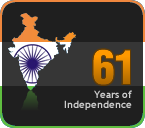
Pishi-moni
When I entered the room every thing seemed so dark I could not make out the figure lying on the bed. . The wooden doors and windowpanes were shut tight excepting the door by which I entered. Gradually things started taking shape. The room was reeking with the smell of stale vomiting and then I saw her lying on a single bed that stood by the wall in the western side of the room. A human skeleton. Nothing in that figure could relate to the image I held of Pishi-moni. Only the head and a bent knee were exposed to an otherwise covered figure. A horribly shrunken, discoloured and rickety frame of the once beautiful person that I was so fond of was lying listless, almost like a body without the trace of life in it. She was covered with a dark coloured printed blanket. A matching pillow case framed her small head. The bedspread , pillow cover and the blanket were proof of being costly once upon a time. Just below her bed was an open bucket and from this the foul stench of retching hit me like a bullet. During my brief stay pishi-moni threw up on the bucket three times.
“She is dying” Priya announced before us, it seemed to me, to create a dramatic effect. Myself and my two teenage daughters were admiring the exhibition of Sparkles diamond jewelry being held at the small ball room in Park Hote when we bumped into Priya, Priyambada Sengupta to be more precise, the vibrant chatterbox, as she was secretly called by us, her relations by marriage.
We looked at her uncomprehendingly?
“It is my ma-in-law, your Pishi-moni. Doctor’s have given notice. There is no chance of survival .It can be any day now. You may come and look her up if you want to. Ok! I am pushing off.” So saying, she vanished mingling with the crowd. She came and went like a whirlwind robbing me of my peace of mind.
The sentence kept coming back throughout the week. “She is dying” . my childhood days floated before my mind’s eye like a chain of delightful dreams. Pishi-moni was our favourite aunt. She was the most intelligent among them all also. Pishi-moni was youngest of the six children that my grandfather had. Those days, we used to spend our holidays at our father’s native place at Uttarpara.. My grandfather had a huge house, with a vast garden which held a pond as well. The garden was full of trees, particularly mango, guava. Pishi-moni would lead us in all our mischievous explorations including making merry on the trees, plucking unripe mangos and guavas, jumping on the pond and swimming to our hearts delight..
She would also arrange for picnics near the pond. We would prepare an oven with three pieces of bricks and make fire with broken twigs. Pishi-moni would then prepare food items like potato curry and rice. Most days the potato would be undercooked and the rice overcooked. Pishi-moni would put enough chilly to make our mouth burn, but we would enjoy it nevertheless gulping water with every mouth full. We would finish off with home made sweets, which Pishi-moni would make us steal from grandma’s room.
I particularly remember the day when I was caught stealing “narkel nadu’ (home made sweets from coconut) from grandma’ cupboard and was made to stand on one leg in the corner of her room with my hands on my ears. Grandma would have let me go unpunished but I was caught by my own mother. As was our secret rule I did not divulge the names of our gang members but somebody informed pishimoni of my plight. She came and straight away declared that it was all her fault only and that she had directed me to steal from grandma. In our childhood one would require a lot of courage to own up to such crime, as our elders were not misers in terms of meting out justice to their juniors. Such punishment as standing on one leg with your hands on your ears, standing bent down like a chair , writing down 120 times that you are sorry, etc were their favourite . From that day on Pishi-moni became my idol.
To us Pishi-moni was the picture of perfection. So loving, so witty and so strong. Later in life when I grew into womanhood and was happily married, I came to know of her disastrous married life. I still remember the day she got married. In a red silken saree woven with golden zari all over and traditional make-up, with gold ornaments that almost covered her small and delicate frame from head to foot, she appeared to me as the princess from my story books. Sambaranda, as I called my new found uncle, her husband was equally, if not more stunning in his looks. Tall, handsome and princely, the envy of the woman folk present on the occasion. After a few years of happy married life, pishi-moni was confronted with a second wife with a child. The marriage it seemed was not registered and the woman was from a very doubtful background. But as I told you before, she was the picture of strength and she dealt with such transgression with so much dignity and resilience that others including my own inquisitive mother could not get the whole truth out of her. Sambaranda was actually in awe of his wife and behind her back carried on with innumerable such affairs with the opposite sex, much to the embarrassment and grief of our beloved Pishi-moni. Ultimately Pishi-moni severed all ties with Sambaranda and lived alone with their only son Ajay.
A very grand reception was given to all when, Ajoy, Pishi-moni’s son was born and also at the wedding of this son with now famous Priya. By the time Ajay graduated from B.E. college, Shibpur and joined a Multinational Company, Sambaranda returned to Pishi-moni, the prodigal husband, a man broken in health , spirit and purse. Sambaranda’s widowed mother, however was living with Pishi-moni all through and told her only son that he can come back only if Pishi-moni forgave and allowed him to and an ever graceful Pishi-moni obliged both. Priya was just the opposite of Pishi-moni. That she talked too much was to underestimate. She talked non-stop and she talked loud to the discomfort of the general listener. She was handsome in a crude sense of the term. A tall, fair and broad girl , in short a buxom woman, with a square face, small nose and smaller eyes, she had a mean look about her. We usually tried to avoid her in the family gatherings as she did not fit in with our mental picture of Pishi-moni’s immediate family.
I was aware that Pishi-moni was suffering from cancer and that her days were numbered. I have also met her in some family gatherings about may be a year back. She appeared washed out and very ill, but still she retained her cheerfulness and her innate strength that I admired most in her.
I decided I must give her a visit. Pishi-moni lived with her son and daughter-in-law in their new pent-house in the posh Alipore area. Sambaranda passed away after a brief illness about a year and half ago.. I went up to the first floor landing. A young girl in her early twenties answered my calling bell. It appeared she was the caretaker appointed by Ajoy & Priya to look after Pishi-moni and from her I could gather that Ajoy and Priya were out and after enquiring about my antecedents she led me to pishi-moni’s room. The room seemed almost dark when I first entered it but gradually things started taking shape before my eyes.
I sat on the chair kept beside her bed most probably for the nursemaid and put my hand gently on Pishi-moni’ burning forehead. There was no response from the ailing figure and I called her in almost a whisper, for I found it difficult to find my normal voice. The nursemaid came to my aid and shook the frail frame with vigour and called in a loud and ugly voice
‘ get up masima (aunty) , see who has come “.
I cringed involuntarily’ be careful, I wanted to say but refrained. The shake was too much for the frail body on the bed and she looked up at me with fear written large on her eyes. I smiled and stroked her gently to calm her and said ‘Pishi-moni, it is me Sujata, your Suji (it was her nickname for me)’. The fear changed slowly to a very vague and distant look in her tired eyes. Clearly, she was finding it difficult to place me. Sujata, she repeated the word slowly and deliberately in a very weak and almost inaudible voice. I had to come closer to hear what she was saying.
‘Sujata, will you give me something to eat. I am hungry.’
With horror I looked at my Pishi-moni, the strong willed woman. The picture of perfection in my mind started crumbling down violently.
‘Don’t start that again before the visitors. You have had what boudimoni directed to me to feed you with. Have more and you are sure to vomit. It is me who cleans the dirt. You know “ this was directed at me “boudimoni takes so much care of her still she is not happy. She is, after all , a nuisance. She is a cunning old woman. See, how she asked for food from you. This is only to make you feel bad about boudimoni “
The shrill and crass voice rang out clear and ugly . Pishi-moni looked helplessly at her and then at me.”
I could not help myself and asked her to shut up rather curtly. Sensing my disapproval the girl rambled on in her coarse voice
“Yes, it is very easy for people to feel sympathy for her . They come and go away. Boudimoni has to take care of this old baggage of bones. She is doing so much for her, spending so much money, still people only criticize her.”
May be it is true that any food at this time might be harmful for the patient but could she not demand to be treated with a little more dignity perhaps. I looked at the girl and wondered at the uncanny resemblance with her employer, Madam Priya, her boudimoni.
I still remember the way Pishi-moni nursed her own old and ailing mother-in-law. She might not have provided her with the luxuries of a paid nurse, and costly surroundings, but she treated her with dignity. She treated her with gentleness and care. She treated her with love. I always marveled at the near fresh and spotless white look of the cloths on and around the old and ailing woman. I could almost smell the ever-present sweet fragrance that emanated from the incense burning in a stand near the bed. I had seen an earthen pot with the lid always on kept under her bed. I have witnessed how very careful and gentle Pishi-moni was in handling the old woman. And yet here she is at her deathbed, at the mercy of a paid nurse, who is not even instructed to handle her with care and respect. She was not probably aware that the first and foremost duty of a nursemaid is to treat her patients, who are totally at her mercy, with dignity. I wondered at the irony of fate. As I knew Pishi-moni, the last thing she would tolerate was indignity. Life is so full of contradictions. One who chose to live alone but with dignity was destined to die without it.
It seemed Ajay and Priya would be late so I prepared to leave when I realized Pishi-moni wanted to say something. Again I bent close and she whispered in a halting and incoherent manner which if phrased properly would sound something like this “Don’t get cross with Priya. She is doing her best. I should not have lived so long. Pray to God that I may join your Sambaranda soon”.
 Waiting
Waiting











